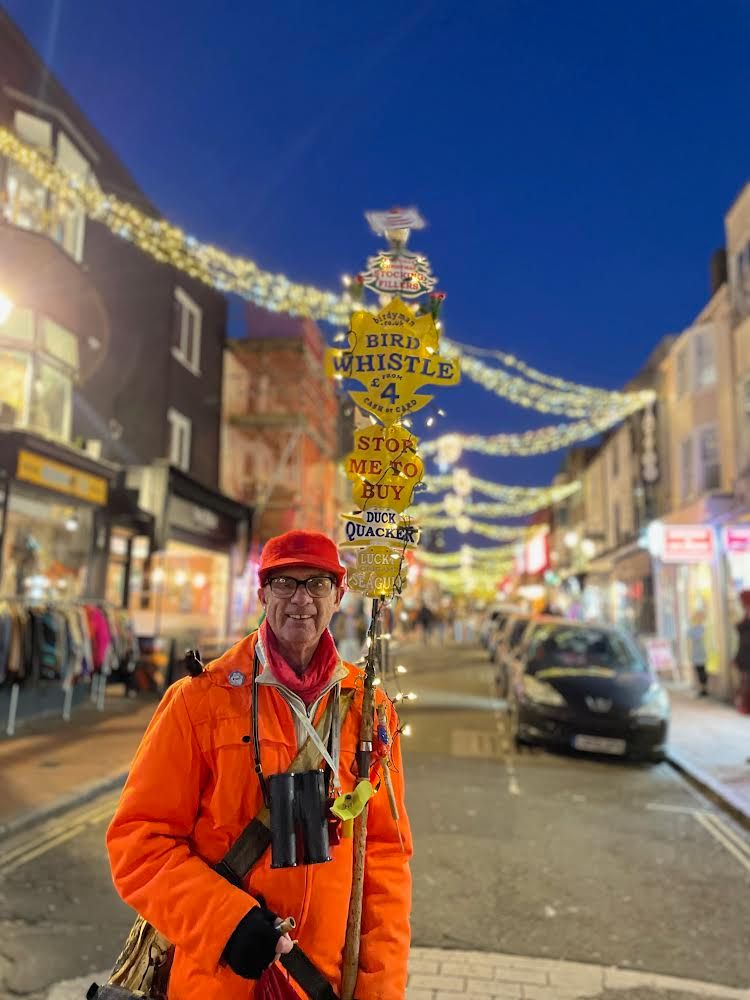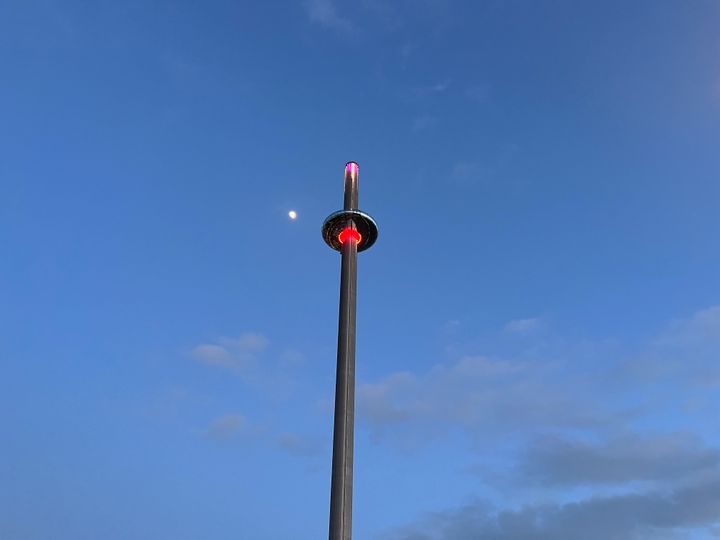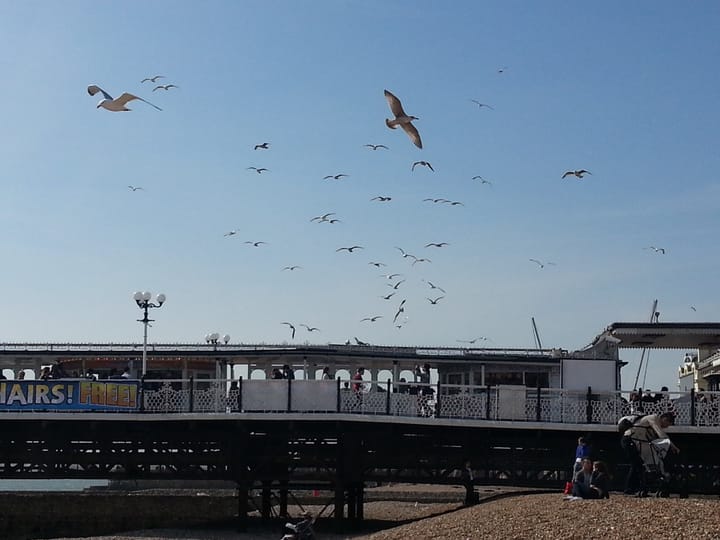A profile of... Birdyman
Roosa Herranen interviews The Birdyman on his career, his whistles and crucially to find out: why birds?

I spot Birdyman, aka Tim Bat, right outside Komedia, writes Roosa Herranen. This isn’t a surprising view for the average Brightonian, as most of us have made our Birdyman sightings in exactly this area. We have scheduled an interview, but just as we decide to approach the café to have a sit down, Birdyman is approached by a customer. A man wants to buy a couple of whistles. I listen in awe as he goes through all the different whistle options he has with ease, some of them hand painted by the salesman himself. Beautiful, colourful ceramic birds. This customer buys two.
“Cash or card?”
As Tim and I finally arrive at the café, my fingers slightly numb from the cold, he lets me know I’m free to start my questions. He is packing up his things, including the famous sign (that he has adorned with Christmas lights to match the lights of North Laine) and the bird whistles. This is good, because I am so excited to ask him my first question: why birds?
“It’s not so much the birds, but the whistles.”
Tim Bat is many things: a pedlar, a warbler, a juggler, a trickster and an all-round performer. He’s originally from Kent but first arrived in Brighton in 1973 to study Fine Art and Printmaking, which was a passion of his. He loved the city straight away. He recalls having walked down to the seafront from the station, through a very different Brighton than we know now, and being amazed by both the piers (West Pier then having been intact). “I could get used to this,” he thought as he stood on the beach.
He describes the first time he saw the Royal Pavilion, never having heard of it before then, and his 'eyes popping out' from amazement. Brighton was rougher, more grim, undeveloped back then. “Waiting for it,” he says. However that didn’t prevent him from wanting to stay.
“So you sort of witnessed the city come to life then?” I ask, to which he replies by assuring me it has always been alive. “Brighton has always had that quality, and I just loved it, and I wanted to stay here.” And stay he did.

In 1980, after a few years of studying in Brighton and an extra couple of years of pondering what he was going to do next, he thought he should spread his wings (so to speak) more. He’d taken the time to develop his juggling act, and the physical act of doing it, so now it was time to share it with the world. Not that he didn’t love being in Brighton, but he felt like he should see what else was out there. This is when he discovered an abundance of performance opportunities in London and beyond. Including the now locally famous bird whistle.
The whistle first came to be a part of his set of tricks when he walked into a magic shop in London, looking for a new trick to add to his juggling routine. The shop keeper was using the whistle and Tim got excited about it straight away. He’d first seen them as a little boy, only advertised in his dad’s Sunday newspaper, thinking they’d never work. Now we all know they do, in fact, work!
He first used the whistles as a part of his court jester routine, juggling and doing different tricks at a medieval themed pub he was hired to entertain guests in. From juggling in TV adverts, being kicked out for putting on a court jester show at the Tower of London, to working with Fringe theatre groups, performing at trendy London nightclubs and the Covent Garden stage as well as creating popular kids’ shows in the later years, Tim Bat has seemed to have done it all.
At the start of it all though, he had a horrible stage fright and was scared of performing. He managed to shake some of the performance anxiety off by doing a little stint as an English teacher, however what really changed things for him was travelling to Spain with some friends he’d met in Brighton. He took the chance and went to Barcelona, successfully performing on La Rambla with his friends, gathering crowds (despite it being 1977 with a difficult political atmosphere, and a ban to gather on the streets) which helped boost his confidence. Even if they did get threats from the Guardia Civil!
What came to be further into his career was his signature act, an archetype of an English gentleman with a bowler hat and an umbrella. It tapped into what was popular and recognisable at the time; Monty Python, Mr Bean, even the TV show The Avengers in the 60s. This character was hugely inspired by Music Hall, silent comedy humour and mime acts. To really personalise his shows, he’s always gotten outfits made and tailored just for him. Constants for Tim Bat’s acts have been top spinning, yo-yo taming, brolly twirling, puppetry and music.

After an exciting career, marriage and kids, Tim retired in 2019. As he talks about how lucky he feels about the timing, just missing the COVID-19 pandemic and the effects it had on the performance industry, he laments for those whose careers it slowed down, changed or even stopped. I share a story about a performer friend of mine who went through the many stages of grief, not the least caused by a cancelled North American tour. Tim sympathises greatly: as he too knows how difficult the industry and these opportunities can be. He acknowledges how a pandemic would have killed the great career he himself had.
“I had a good run,” he says, as he tells me about the tours he’s done all around the world: Japan, India, Iceland and all around Europe, including my home country of Finland.
He loves performing, but recalls when his body started working against him. “Juggling is hard work,” he says, and almost in the same breath calls himself an old man. It’s a physical art form, so retiring for him was due. But now that he is retired, he is content with Birdyman: another performance act of his in a way, an eccentric character he’s created. Somehow over the years however all his acts, including Birdyman, have moulded more and more into himself.
The older I got, even with my juggling act, more real my character became. I created the character because I was shit scared to stand up and perform. Over the years, you get over that.
What about people coming up to him for a chat? “It’s touching,” he says, to be approached by people who give him positive feedback. The other week a girl came up to him, insisting on giving him 'a tip' without buying anything, saying he always makes her day. Sometimes he’s even approached by people who, as kids, saw the shows he did back then. This for him is amazing.
Whether you love Birdyman or not, if you enjoy the tweeting or it grates your ears, there is no denying he is one of the living institutions of the city. Tim Bat is happy to be a part of the landscape. Though always excited to meet 'the wonderful people' of the city, he often forgets people might recognise him. “I never approach anyone, they approach me. And that says it all, I don’t have to.”
“Some people just get it,” he says referring to Birdyman and the people who he sees when out and about, “and I really appreciate that, it’s really gratifying.”
Before we finish our chat, I present Tim Bat with one final question: how would he describe his career in one word? After thinking about it for a moment, the answer is clear.
Fun. My entire career has been based on me having fun. Me doing whatever I wanted, not being told what to do. Fun is the word.




Comments ()